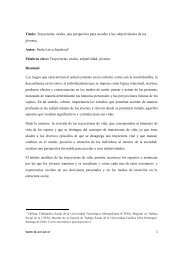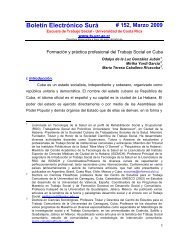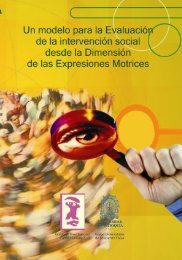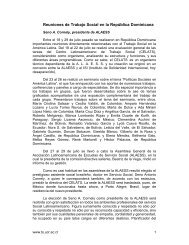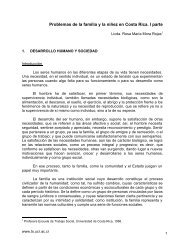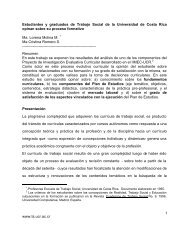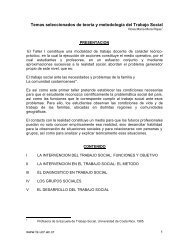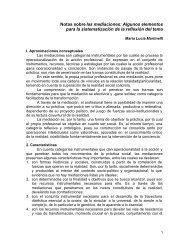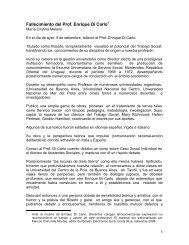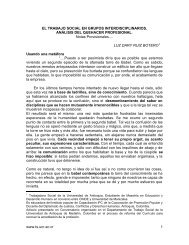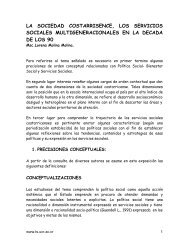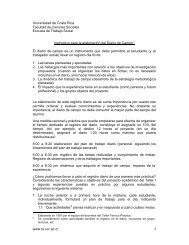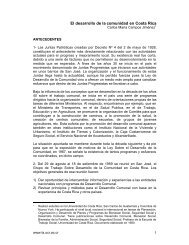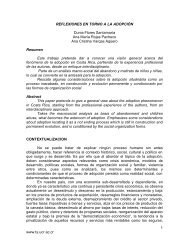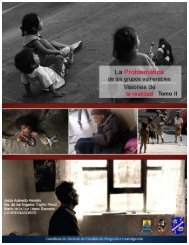Envejecimiento y cultura en América Latina y el Caribe. - Ts.ucr.ac.cr
Envejecimiento y cultura en América Latina y el Caribe. - Ts.ucr.ac.cr
Envejecimiento y cultura en América Latina y el Caribe. - Ts.ucr.ac.cr
Create successful ePaper yourself
Turn your PDF publications into a flip-book with our unique Google optimized e-Paper software.
TIEMPO LIBRE Y ESPARCIMIENTO FAMILIAR. UN ESPACIO PARA LA INTEGRACIÓN…<br />
salud y la de los demás”3 y que <strong>en</strong>foca h<strong>ac</strong>ia <strong>el</strong> equilibrio interno y externo<br />
de la persona como <strong>en</strong>te bio‐psico‐social, procurando <strong>el</strong> auto cuidado a través<br />
de un trabajo colectivo, se busca <strong>en</strong> esta reflexión realizar un aporte a<br />
niv<strong>el</strong> familiar y comunitario que permita establecer la r<strong>el</strong><strong>ac</strong>ión exist<strong>en</strong>te<br />
<strong>en</strong>tre la práctica re<strong>cr</strong>eativa y la salud m<strong>en</strong>tal e integr<strong>ac</strong>ión familiar como<br />
f<strong>ac</strong>tores que condicionan ese “apr<strong>en</strong>der a convivir” por parte de los miembros<br />
d<strong>el</strong> grupo familiar con las personas mayores, miembros de su núcleo<br />
básico.<br />
Abstr<strong>ac</strong>t<br />
To come closer the topic on the use of the free time in the major people and<br />
to assume the re<strong>cr</strong>eational pr<strong>ac</strong>tice as form of prev<strong>en</strong>tion curr<strong>en</strong>tly and future<br />
for physical ‐ m<strong>en</strong>tal healthy there is cited as an example: the<br />
Universal Declaration of the Human rights of the United Nations Organization,<br />
in which indicators of standard of living distinguish thems<strong>el</strong>ves,<br />
one of which is a “Playtime and Re<strong>cr</strong>eation”. It is specify that “Every people<br />
have to the right for resting and <strong>en</strong>joying in his free time and the<br />
rational limitation of the time of the job and periodic holidays”. Like also<br />
the Right to health, “The universal <strong>ac</strong>cess to the Health is a right that every<br />
society must guarantee his citiz<strong>en</strong>s for the only f<strong>ac</strong>t being person,<br />
without considerations of his socio‐economic situation. A suitable and opportune<br />
att<strong>en</strong>tion in the illness is a right as important as the dealing that<br />
the person receives, as it is to be provided with the information and the<br />
stimulus to prev<strong>en</strong>tive conducts”.<br />
In this s<strong>en</strong>se, the re<strong>cr</strong>eational pr<strong>ac</strong>tice and the productive free time are<br />
constituted a way for canalizing the free time in suitable form, as w<strong>el</strong>l as<br />
to cheer up t<strong>en</strong>sions that the <strong>en</strong>vironm<strong>en</strong>t causes on the mayor person. In<br />
this way, we are preparing for inconv<strong>en</strong>i<strong>en</strong>t situations for the m<strong>en</strong>tal and<br />
organic health that, perman<strong>en</strong>tly, is affected his world of familiar and<br />
community social inter<strong>ac</strong>tion.<br />
Basing on the Integral or Educational Mod<strong>el</strong> of Education for the Health,<br />
defined like “Social process of learning f<strong>ac</strong>ed to the auto responsibility of<br />
the individuals and the communities, in def<strong>en</strong>se of its own health and that<br />
of the others” and that focuses towards the internal and external balance of<br />
the person like bio‐psychosocial <strong>en</strong>tity, trying the s<strong>el</strong>f‐care <strong>ac</strong>ross a collective<br />
work, one thinks about how in this reflection to realize a contribution<br />
at familiar and community lev<strong>el</strong> that allows to establish the existing r<strong>el</strong>ation<br />
betwe<strong>en</strong> the re<strong>cr</strong>eational pr<strong>ac</strong>tice and the m<strong>en</strong>tal health and familiar<br />
integration like f<strong>ac</strong>tors that determine that one “to learn to coexist” on the<br />
part of the members of the familiar group with the biggest persons, members<br />
of his basic nucleus.<br />
3<br />
Lineros, D. (2005, <strong>en</strong>ero). Asignatura Educ<strong>ac</strong>ión para la salud. Apuntes Doctorado Psicología y<br />
Educ<strong>ac</strong>ión. Chile.<br />
124



